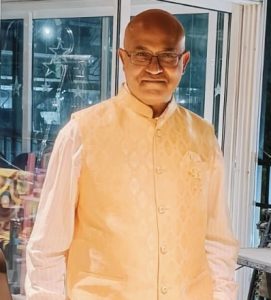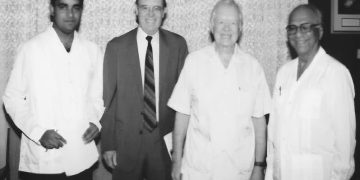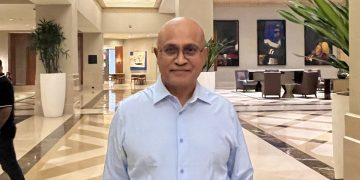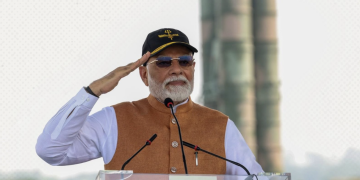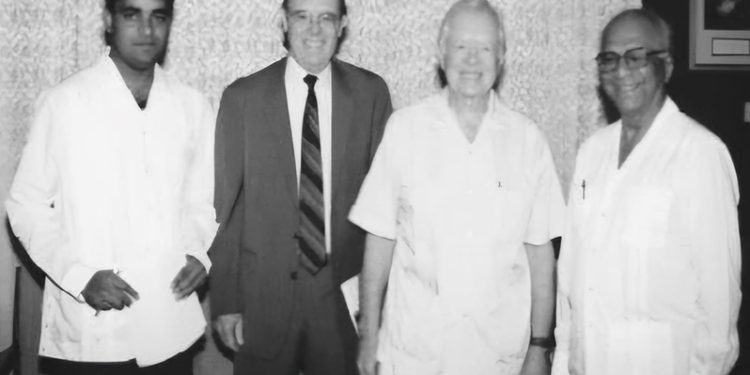The late President Carter is credited with helping to restore democracy in Guyana. Vice President Bharrat Jagdeo held Carter in high regard and paid laudatory tributes to him. The late President may have played a role in Jagdeo’s rise from being a Junior Minister of Finance to his promotion to Minister of Finance and ultimately President.
Carter led the observer mission to Guyana in 1992 for the first democratic elections post independence that led to Jagan becoming President. Carter became familiar with improvement in Guyana’s economy. Jagan had continued the economic liberalizaion program (ERP) embraced by Desmond Hoyte. The policy was continued by Asgar Ally who was replaced by Jagdeo. Carter credited Minister Jagdeo for improvement in the economy. When Carter met President Cheddi Jagan, he showered accolades on the young Jagdeo for his stewardship of the economy. He told Jagan he was quite impressed with the young man’s handling of the economy and stated there was a bright future for him. Jagan had put Jagdeo in charge of negotiation of debt repayment that was sucking some 92% of the revenues just to pay the interst on the debt of US$2.2 billion left by the PNC regime. Jagdeo was credited with gaining debt relief from the Paris Club nations that was canceling debts of heavily indebted countries like Guyana. Over US$1 billion was cancelled. Most of the rest of the debt was subsequently either cancelled or paid off; Trinidad and Tobago, India, and some Middle Eastern countries cancelled debts as well.
Jagdeo’s handling of the economy created a solid reputation with the Jagan’s that led to his endorsement by Janet Jagan as a ‘youth’ figure of the A Team for the December 1997 election following Cheddi’s sudden passing earlier that year. The PPP won a comfortable victory. Unfortunately, the opposition rejected Janet Jagan as President resulting in violence and political instability. Janet resigned in August 1999 and Jagdeo succeeded her.
Carter was a friend of freedom in Guyana, and Guyanese in the diaspora as well as in Guyana remember him for his contribution to democracy. He was lobbied by the diaspora in USA as well as by Cheddi Jagan and opposition parties in Guyana to help secure free and fair elections.
Without his involvement, there would not have been democratic elections. And without his presence in Guyana to douse the flame of violence stirred up by a thuggish strongman, there would not have been a change in administration in October 1992. Cheddi Jagan honored Carter with the country’s highest award for his role in restoring democracy in Guyana and for being a champion of human rights and peace globally.
Carter had recommended a number of constitutional changes to address ethnic issues and conflict. Regrettably, these were not implemented. But the late American President left his mark on the Guyanese nation with free and fair elections. He inspired Guyanese to have democratic elections. Rigging was rejected as was attemped in March 2020. Carter’s grandson, Jason, who I had the honor of meeting almost daily late February 2020 and for almost a week after the March 2 election during daily press conferences to condemn manipulated voting counts, continued the great work of his grandfather. The Carter Center, through Jason’s presence in Guyana and his role from from Atlanta, helped to protect the democratic outcome of the March 2, 2020 vote although it took five months. Jason was denied a request during Covid to return to Guyana for the recount of votes, but he stayed in touch with observers who remained behind. Thank you Jason!
Jagdeo and Irfaan Ali were (are) beneficiaries of Carter’s legacy in Guyana and the role of the diaspora from USA that lobbied the Carter Center to take up the cause of free and fair elections in the homeland. They and the country owe the late President a debt of gratitude.
